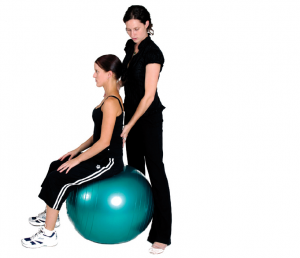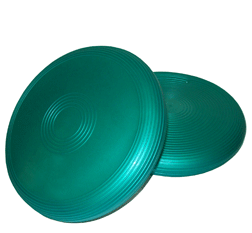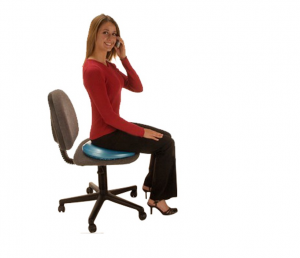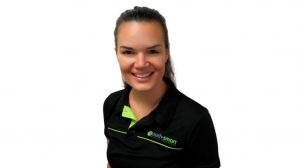itballs, Swiss balls or exercise balls are becoming more and more common and are used by many people at the home and in the gym for various different types of exercise and fitness activities. Many of you may have seen people around your office or at home using a fitball while sitting and working at a desk. You may have wondered yourself, would this be good for me? As a general rule, the use of a fitball in place of an office chair is not good for the spine or the body and the reasons why will be discussed throughout this article.
 When sitting on a fitball, we are seated on an unstable base. We are therefore much more reliant on our postural muscles to stabilise ourselves in sitting. This means the postural muscles are switched on and working at all times to hold the body upright. Our postural muscles fatigue quickly and depending on the person, most people have a maximum amount time that they can challenge these muscles, which is usually around 20 minutes at a time. When this short period of time is over, most people will tend to slouch or recruit large muscle groups for postural stability – something which they’re not meant to do, leading to dysfunctional muscle recruitment patterns being established.
When sitting on a fitball, we are seated on an unstable base. We are therefore much more reliant on our postural muscles to stabilise ourselves in sitting. This means the postural muscles are switched on and working at all times to hold the body upright. Our postural muscles fatigue quickly and depending on the person, most people have a maximum amount time that they can challenge these muscles, which is usually around 20 minutes at a time. When this short period of time is over, most people will tend to slouch or recruit large muscle groups for postural stability – something which they’re not meant to do, leading to dysfunctional muscle recruitment patterns being established.
A fitball is an important exercise rehabilitation item that is aimed to be used for short periods of time. Sitting on a fitball for extended periods of time in an office environment is not good for the body. Just like the other muscles in the body, postural muscles fatigue. When our postural muscles fatigue, we tend to slouch, increasing strain and pressure through our spine. Although most of us try not to, when we do slouch in our usual office chairs we have a back support to offer us some help so that our muscles are not continuously contracting in a bad position. Slouching on a fitball is even worse than slouching in a normal office chair. With absolutely no support for our back, we are activating our muscles in a non-ideal position and increasing the strain through our lower back and shoulders and leaving us with more tightness.
Unlike an office chair which can be adjusted based on task requirements, fitballs can not be easily adjusted in an office environment. Usually the height of a fitball is determined by the person’s height and leg length. If an individuals office table height is not easily adjustable (electronic height adjustable table) using the fitball at its optimum height may make it inappropriate for accessing the keyboard and mouse. This means compensation will occur through other areas of the body – excessive shoulder elevation or slumping, to reach the mouse and keyboard.
This means compensation will occur through other areas of the body – excessive shoulder elevation or slumping, to reach the mouse and keyboard.
The best solution?
If you do want to incorporate some postural muscle work out into your work day, dura-discs (inflatable 1-2 inch thick circular discs) can be used for periods of 20 minutes at a time occasionally throughout the day to challenge the postural muscles. Alternatively, make sure you have a fitted, ergonomic office chair and incorporate some postural and core muscle work into your exercise routine.
 Despite what it may sound like, fitballs are a fantastic piece of rehabilitation equipment. They just have to be used correctly and in the right situations. Due to their unstable base, they are great for challenging our core and postural muscles as part of a structured work out. By incorporating a fitball into your exercise routine, exercises not only become more challenging, but a much larger amount of exercises can be performed, making your work out a lot more interesting!
Despite what it may sound like, fitballs are a fantastic piece of rehabilitation equipment. They just have to be used correctly and in the right situations. Due to their unstable base, they are great for challenging our core and postural muscles as part of a structured work out. By incorporating a fitball into your exercise routine, exercises not only become more challenging, but a much larger amount of exercises can be performed, making your work out a lot more interesting!
For further information about how to exercise safely please talk to your treating physiotherapist. Exercise consultations can also be booked to go through fitball use for internal stability.
 Written by Louise Murgtagh BSc (Physio), a Physiotherapist at Bodysmart’s St Georges Terrace Clinic and one of Bodysmart’s Ergonomic Consultants.
Written by Louise Murgtagh BSc (Physio), a Physiotherapist at Bodysmart’s St Georges Terrace Clinic and one of Bodysmart’s Ergonomic Consultants.
If you would like to ask Louise a question or make a booking contact us on (08) 9481-8708.











